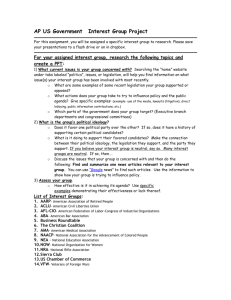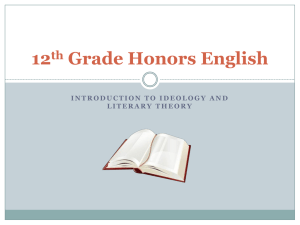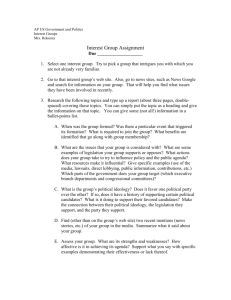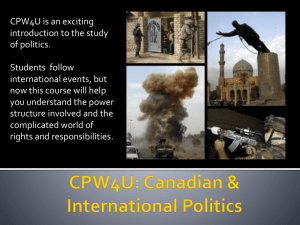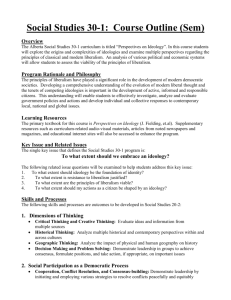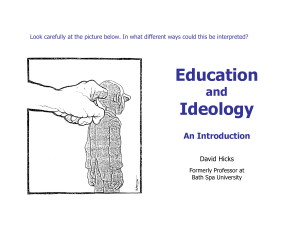Document 10465619
advertisement
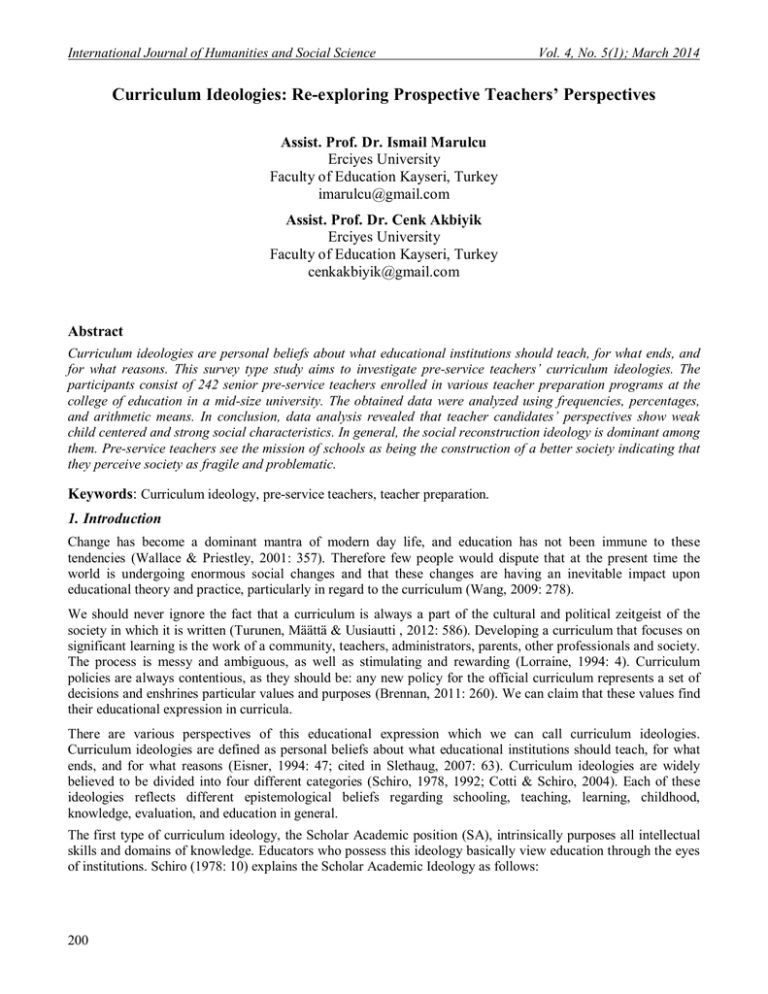
International Journal of Humanities and Social Science Vol. 4, No. 5(1); March 2014 Curriculum Ideologies: Re-exploring Prospective Teachers’ Perspectives Assist. Prof. Dr. Ismail Marulcu Erciyes University Faculty of Education Kayseri, Turkey imarulcu@gmail.com Assist. Prof. Dr. Cenk Akbiyik Erciyes University Faculty of Education Kayseri, Turkey cenkakbiyik@gmail.com Abstract Curriculum ideologies are personal beliefs about what educational institutions should teach, for what ends, and for what reasons. This survey type study aims to investigate pre-service teachers’ curriculum ideologies. The participants consist of 242 senior pre-service teachers enrolled in various teacher preparation programs at the college of education in a mid-size university. The obtained data were analyzed using frequencies, percentages, and arithmetic means. In conclusion, data analysis revealed that teacher candidates’ perspectives show weak child centered and strong social characteristics. In general, the social reconstruction ideology is dominant among them. Pre-service teachers see the mission of schools as being the construction of a better society indicating that they perceive society as fragile and problematic. Keywords: Curriculum ideology, pre-service teachers, teacher preparation. 1. Introduction Change has become a dominant mantra of modern day life, and education has not been immune to these tendencies (Wallace & Priestley, 2001: 357). Therefore few people would dispute that at the present time the world is undergoing enormous social changes and that these changes are having an inevitable impact upon educational theory and practice, particularly in regard to the curriculum (Wang, 2009: 278). We should never ignore the fact that a curriculum is always a part of the cultural and political zeitgeist of the society in which it is written (Turunen, Määttä & Uusiautti , 2012: 586). Developing a curriculum that focuses on significant learning is the work of a community, teachers, administrators, parents, other professionals and society. The process is messy and ambiguous, as well as stimulating and rewarding (Lorraine, 1994: 4). Curriculum policies are always contentious, as they should be: any new policy for the official curriculum represents a set of decisions and enshrines particular values and purposes (Brennan, 2011: 260). We can claim that these values find their educational expression in curricula. There are various perspectives of this educational expression which we can call curriculum ideologies. Curriculum ideologies are defined as personal beliefs about what educational institutions should teach, for what ends, and for what reasons (Eisner, 1994: 47; cited in Slethaug, 2007: 63). Curriculum ideologies are widely believed to be divided into four different categories (Schiro, 1978, 1992; Cotti & Schiro, 2004). Each of these ideologies reflects different epistemological beliefs regarding schooling, teaching, learning, childhood, knowledge, evaluation, and education in general. The first type of curriculum ideology, the Scholar Academic position (SA), intrinsically purposes all intellectual skills and domains of knowledge. Educators who possess this ideology basically view education through the eyes of institutions. Schiro (1978: 10) explains the Scholar Academic Ideology as follows: 200 © Center for Promoting Ideas, USA www.ijhssnet.com Curriculum developers working within the SA Ideology view curriculum creation from the perspective of the academic disciplines. They assume a loose equivalence between the academic disciplines, the world of the intellect, and the world of knowledge. The central task of education is taken to be the extension of the components of this equivalence. They are to be extended both on cultural level, as reflected in the discovery of new truth, and on the individual level, as reflected in the enculturation of individuals into civilization’s accumulated knowledge and ways of knowing. Secondly, the Social Efficiency Ideology (SE) believes that the initial purpose of schooling is to meet the needs of society. Curriculum developers and educators who adopted the Social Efficiency Ideology view the curriculum as an instrument that prepares students to be contributing members of society and support the view that schools are places where students are prepared for a meaningful adult life. The central concern of the Social Efficiency Ideology is scientific instrumentalism. This concern asserts that curriculum should be developed in a scientific manner and that curriculum development should be an instrument for fulfilling the wishes of a client. The curriculum developer’s first job is to determine the needs of society – his client. The things that will fulfill these needs are called the terminal objectives of the curriculum. The developer must then find the most efficient way of producing a product, the educated man, who meets the terminal objectives of the curriculum and thus fulfils the needs of society (Schiro, 1978: 9) The third belief, the Child Study position (CS), represents a child centered perspective. This ideology aims to create more enjoyable school settings where children naturally train themselves for socialization. According to the Child Study Ideology teachers should be able to present meaningful experiences for students in order to contribute to their learning experiences. The child study developer conceives of the child as containing his own capabilities for growth, as the agent who must actualize his own capabilities, and as essentially good in nature. In addition, the child is viewed as the source of content for the curriculum; his ends and his means are considered to be the appropriate ends and means for the curriculum (Schiro, 1978: 11). The last category of curriculum ideology, the Social Reconstruction position (SR), represents a social perspective. It assumes that society is fragile and therefore should be reconstructed. In this reconstruction process educators and schools are seen as active agents of this transformation. Social Reconstruction developers assume that education of the masses is the social process through which the society is to be reconstructed. These developers have supreme faith in the ability of education, through the medium of curriculum, to educate students to understand the nature of their society in such a way that they will develop a vision of a better society, and then act so as to bring that vision into existence (Schiro, 1978: 12). 2. Aim The aim of this study is to reveal the curriculum ideologies of senior teacher candidates studying in Erciyes University’s College of Education, a teacher education institution in a mid-size university located in Kayseri Turkey. The ideologies of the participants were investigated by making a categorization of the ideologies as follows: Scholar Academic (SA), Child Study (CS), Social Reconstruction (SR), and Social Efficiency (SE). 3. Methodology The study was planned and conducted as a survey type research. Data wer collected by means of a survey which was developed by Schiro in 1978 to explore teachers’ curriculum ideologies. The survey consists of seven items to reveal ideological perspectives. Each one of these items is related with one particular concept. The concepts are school, learning, teacher, childhood, knowledge, evaluation and slogan of education. For each one of these concepts, participants are expected to rank four statements, each statement representing one of the four different ideological perspectives (scholar academic, social reconstruction, child study, social efficiency). A 4 points scale (1 meaning strongly disagree and 4 meaning strongly agree) is used for ranking the statements. With the permission of Dr. Schiro, one of the researchers translated his survey into Turkish. The survey was then retranslated into English by the second author to control semantic shift. 201 International Journal of Humanities and Social Science Vol. 4, No. 5(1); March 2014 After checking and correcting the Turkish form of the survey, it was given to two experts of Turkish language. The experts inspected the survey and made corrections on its language. Because the points obtained from each subdivision of the survey are not addable, an internal reliability coefficient was not calculated. The participants of the research consisted of all senior students studying at Erciyes University’ College of Education. There are seven programs at the college. The sample of the study consists of 242 randomly selected senior pre-service teachers from these programs. The data collected was entered into a spreadsheet file, and descriptive analyses were conducted using frequencies, percentages, and arithmetic means. 4. Results 4.1. School Concept Table 1 illustrates the distribution of perspectives of pre-service teachers about their concept of school. Among pre-service teachers, the most popular curricular ideology was found to be social reconstruction ( = 3.06). On the other hand, scholarly academic ideology was the least popular ideology among pre-service teachers regarding the school concept ( = 1.64). Table 1: Distribution of perspectives about school concept Strongly Strongly Agree Disagree Agree Disagree School Scholar Academic f % f Child Study % Social f Reconstruction % Social f Efficiency % 30 12.40 39 16.12 135 55.79 38 15.70 33 13.64 54 22.31 47 19.42 108 44.63 57 23.55 77 31.82 33 13.64 75 30.99 122 50.41 72 29.75 27 11.16 21 8.68 1.64 1.93 3.06 2.36 4.2. Learning Concept Table 2 shows the distribution of perspectives of pre-service teachers about the learning concept. The social reconstruction ideology is the most accepted ( = 3.49) and scholar academic is the least accepted ( = 1.52) ideology for the concept of learning. Table 2: Distribution of perspectives about learning concept Learning Scholar Academic f % f Child Study % Social f Reconstruction % Social f Efficiency % Strongly Agree Agree Disagree Strongly Disagree 8 3.31 39 16.12 182 75.21 13 5.37 24 9.92 91 37.60 24 9.92 106 43.80 54 22.31 73 30.17 8 3.31 104 42.98 156 64.46 39 16.12 28 11.57 19 7.85 1.52 2.54 3.49 2.47 4.3. Teacher Concept In Table 3, the distribution of perspectives of pre-service teachers about the teacher concept is shown. According to the table, pre-service teachers’ responses were divided among three ideologies. The child study ( = 2.95), social reconstruction ( = 2.80) and social efficiency ( = 2.80) ideologies have similar degrees of popularity among teacher candidates. On the other hand, the scholar academic ( = 1.46) ideology has low popularity regarding the teacher concept. 202 © Center for Promoting Ideas, USA www.ijhssnet.com Table 3: Distribution of perspectives about teacher concept Teacher Scholar Academic f % f Child Study % Social f Reconstruction % Social f Efficiency % Strongly Agree Agree Disagree Strongly Disagree 17 7.02 85 35.12 57 23.55 85 35.12 15 6.20 74 30.58 91 37.60 60 24.79 31 12.81 69 28.51 82 33.88 61 25.21 179 73.97 14 5.79 12 4.96 36 14.88 1,46 2.95 2.80 2.80 4.4. Childhood Concept Table 4 shows the distribution of perspectives of pre-service teachers about the childhood concept. From the table we can see that the social reconstruction ideology is the most popular ideology compared to the others regarding the childhood concept while the scholar academic ideology is the least popular one. Table 4: Distribution of perspectives about childhood concept Childhood Scholar Academic f % f Child Study % Social f Reconstruction % Social f Efficiency % Strongly Agree Agree Disagree Strongly Disagree 23 9.50 53 21.90 115 47.52 50 20.66 49 20.25 78 32.23 55 22.73 60 24.79 66 27.27 57 23.55 35 14.46 84 34.71 104 42.98 54 22.31 37 15.29 48 19.83 1,96 2.54 3.02 2.46 4.5. Knowledge Concept Table 5 illustrates the distribution of perspectives of pre-service teachers about the concept of knowledge. It can be seen that all ideologies have similar degrees of popularity among teacher candidates regarding the knowledge concept. However, the social reconstruction ideology seems to be a little more popular. Table 5: Distribution of perspectives about knowledge concept Knowledge Scholar Academic f % f Child Study % Social f Reconstruction % Social f Efficiency % Strongly Agree Agree Disagree Strongly Disagree 42 17.36 30 12.40 93 38.43 77 31.82 42 17.36 44 18.18 69 28.51 89 36.78 80 33.06 74 30.58 42 17.36 44 18.18 78 32.23 94 38.84 38 15.70 32 13.22 2,20 2.04 2.90 2.87 4.6. Evaluation Concept Table 6 illustrates the distribution of perspectives of pre-service teachers about the evaluation concept. Here teacher candidates favor the social reconstruction ideology more than the others. The scholar academic ideology is the least favored ideology regarding the evaluation concept. 203 International Journal of Humanities and Social Science Vol. 4, No. 5(1); March 2014 Table 6: Distribution of perspectives about evaluation concept Evaluation Scholar Academic f % f Child Study % Social f Reconstruction % Social f Efficiency % Strongly Agree Agree Disagree Strongly Disagree 10 4.13 33 13.64 170 70.25 29 11.98 46 19.01 78 32.23 39 16.12 79 32.64 58 23.97 71 29.34 21 8.68 92 38.02 128 52.89 60 24.79 12 4.96 42 17.36 1.74 2.35 3.52 2.39 4.7. Slogan Concept Table 7 shows the distribution of perspectives of pre-service teachers about slogan of education. There are two popular ideologies regarding the slogan. Teacher candidates show a very close distribution between the child study and social efficiency ideologies. Table 7: Distribution of perspectives about slogan of education Slogan Scholar Academic f % f Child Study % Social f Reconstruction % Social f Efficiency % Strongly Agree Agree Disagree Strongly Disagree 16 6.61 98 40.50 53 21.90 75 30.99 31 12.81 70 28.93 49 20.25 92 38.02 90 37.19 31 12.81 68 28.10 53 21.90 105 43.39 43 17.77 72 29.75 22 9.09 1.83 2.92 2.34 2.91 5. Discussion Curriculum ideologies in any decade are important to shape educational decisions for both policymakers and educators as well. Although these types of studies emerged several decades ago, it is still necessary to investigate such perspectives because, as the world changes at a very fast pace, we need to revisit such ideas in order to revise them for our times and apply them to new situations. The primary purpose of the present study is to explore the curriculum ideologies of future teachers enrolled in different programs in a faculty of education in a mid-size university. The findings of the study show that the child study and social reconstruction ideologies are the most popular perspectives among pre-service teachers. The majority of pre-service teachers accept the social reconstruction ideology for the concepts of school, learning, childhood, knowledge, and evaluation. Child study ideology seems to be another popular ideology among teacher candidates. The child study is found to be the most popular ideology regarding the teacher and slogan of education concepts. On the other hand, teacher candidates accept the scholar academic ideology as the least popular ideology. This ideology is the least preferred one regarding school, learning, teacher, childhood, and evaluation and slogan of education concepts. Regarding the school concept, the teacher candidates prefer the social reconstruction ideology more than the others. As explained before, this ideology represents a social perspective. Results also show that only a minority of the participants place importance on making schools enjoyable places for children (the Child Study Ideology) or academic disciplines (the Scholar Academic Ideology). These findings indicate that teacher candidates probably assume that society is in an unhealthy condition and it should be reconstructed. 204 © Center for Promoting Ideas, USA www.ijhssnet.com They probably see the mission of schooling as to educate children in order to take action in constructing a better society. Similar findings were obtained for the learning and evaluation concepts. Pre-service teachers seem to give value to learning and evaluation, probably as tools to raise well prepared citizens in the process of constructing a better society. However, we see quite different results when we examine participants’ opinions about the teacher concept. Maybe, because teachers are individuals, teacher candidates seem to express their opinions about the teacher concept on an individual basis. Regarding the teacher concept, they give equal importance to the child study, social reconstruction, and social efficiency ideologies. This result shows us that teacher candidates perceive teachers as professionals who use the curriculum as a tool for preparing children for society (Social Efficiency), for solving the problems of society (Social Reconstruction), and for presenting meaningful learning experiences to children (Child Study). The results regarding the childhood concept are interesting. Although teacher candidates favor the social reconstruction ideology more, they seem to value both the child study and the social efficiency ideologies as well. These findings tell us that although teacher candidates give importance to children’s needs and nature, they see childhood as a time of learning that prepares one for adulthood. The findings of the current study prove that the Scholar Academic Ideology is the least favored among curriculum ideologies. However, this situation is slightly different for the knowledge concept. Although pre-service teachers perceive knowledge from a social perspective, they also give importance to its academic aspect. We can interpret this finding as sign that teacher candidates consider the curriculum as a tool to transmit knowledge to young generations for solving social problems, for raising future members of society, also for the transmission of accumulated knowledge. Finally, when teacher candidates were asked to rank the slogan of education, they favored “natural growth of the child” (Child Study) and “to possess the skills which allow one to perform well within one's society” (Social Efficiency) slogans more. In conclusion, when we consider all findings from a holistic viewpoint, we can interpret them as meaning that teacher candidates perceive society in Turkey as fragile and problematic. They see the mission of schools and learning as being the construction of a better society. On the other hand, when teacher candidates think about the teacher, childhood and slogan of education concepts, we can see that a child centered viewpoint combined with a social perspective comes to the surface. To a greater or lesser degree the radical changes in school curriculum policy that are currently occurring in many countries around the world are being driven by discourses pertaining to globalization that stress the need for education systems to prepare school students for participation in a competitive global economy (Yates & Young 2010; cited in Winter, 2012: 295). The findings above could be explained by today’s scientific and technological progress, the economy, global integration, and culture. In the last decade, the Turkish economy has experienced great acceleration and global integration which has affected every component of society. Also, traditionally, Turkish society has a paternalistic character and puts greater emphasis on society than on individuals. However, a flourishing democratic and individual centered perception has accompanied this economic growth, probably causing confusion and ambiguity. In addition, a constructivist approach was adopted in education and all K-12 national curricula were revised after 2004. In spite of this, because the impacting factors are so numerous and, curriculum reform is a different procedure (Duru & Korkmaz, 2010: 68), the transition process has been painful. In short, the country’s economical, political, and educational agendas seen rapid changes and brought about a shift in perceptions. 205 International Journal of Humanities and Social Science Vol. 4, No. 5(1); March 2014 6. References Brennan. M. (2011). National curriculum: A political-educational Tangle. Australian Journal of Education, 55(3): 259–280. Cotti, R & Schiro, M. (2004). Connecting teacher beliefs to the use of children’s literatur in the teaching of mathematics. Journal of Mathematics Teacher Education, 7: 329–356. Duru, A. & Korkmaz, H. (2010). Teachers’ views about a new mathematics curriculum and difficulties encountering curriculum change. Hacettepe University Journal of Education. 38: 67-81. Lorraine, O. A. (1994). Creating a curriculum that works: A guide to outcomes-centered curriculum decisionmaking. National Catholic Educational Association, Washington, D.C. Schiro, M. (1978). Curriculum for better schools: The great ideological debate. Englewood Cliffs, NJ: Educational Technology Publications. Schiro, M. (1992). Educators’ perceptions of changes in their curriculum belief systems over time. Journal of Curriculum and Supervision, 7 (3), 250–286. Slethaug, G. (2007). Teaching abroad international education and the cross-cultural classroom. Hong Kong University Press. Turunen, T. A.; Määttä, K. & Uusiautti, S. (2012). Forty years of Finnish pre-school education: the development of curricula between 1972 and 2000. Curriculum Journal, 23(4): 585-599. Wallace, C. S. & Priestley, M. (2011). Teacher beliefs and the mediation of curriculum innovation in Scotland: A socio-cultural perspective on professional development and change. J. Curriculum Studies, 43( 3): 357– 381. Wang, T. (2009). Toward a productive and creative curriculum in architecture. Arts and Humanities in Higher Education, 8 (3): 277 – 294. Winter, C. (2012): School curriculum, globalization and the constitution of policy problems and solutions. Journal of Education Policy, 27:3, 295-314 Yates, L., & M. Young. 2010. Editorial: globalization, knowledge and the curriculum. European Journal of Education, 45(1): 4–10. 206
